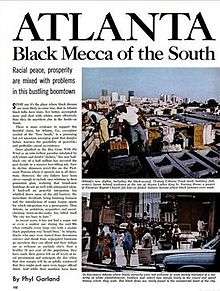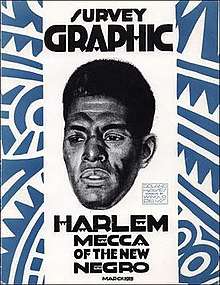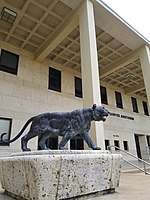Black mecca
A black mecca, in the United States, is a city to which African Americans, particularly singles, professionals, and middle-class families,[1] are drawn to live, due to some or all of the following factors:
- superior economic opportunities for blacks, often as assessed by the presence of a large black upper-middle and upper class
- black businesses and political power in a city
- leading black educational institutions in a city
- a city's leading role in black history, arts, music, food, and other cultures
- harmonious black-white race relations in a city
| Part of a series on | ||||||||||||
| African Americans | ||||||||||||
|---|---|---|---|---|---|---|---|---|---|---|---|---|
|
||||||||||||
|
||||||||||||
|
Religion
|
||||||||||||
|
Politics
|
||||||||||||
|
Civic / economic groups
|
||||||||||||
|
Sports
|
||||||||||||
|
Sub-communities
|
||||||||||||
|
Dialects and languages
|
||||||||||||
|
Population
|
||||||||||||
| ||||||||||||
Atlanta has been referred to as a black mecca since the 1970s, while New York City's Harlem was referred to as a black mecca during the Harlem Renaissance of the 1920s, 1930s, 1940s and still is today.[2][3][4]
Current
Atlanta has been widely noted as a black mecca since the 1970s.[5][6][7][8][9][10][11][12][13][14][15][16][17][18][19][20][21]

In 1971, Ebony magazine called Atlanta the "black mecca of the South", because "black folks have more, live better, accomplish more and deal with whites more effectively than they do anywhere else in the South—or North".[15] Ebony illustrated as evidence of "mecca" status Atlanta's high black home ownership, the Atlanta University Center (the nation's largest consortium of historically black colleges (HBCUs)), Atlanta's civil rights heritage, black business ownership, black-owned restaurants, the civic leadership of the black clergy, black fraternal organizations, and black political power in City Hall, while it also acknowledged the poverty which a large percentage of Atlanta's black population endured.
In 1974, Atlanta became the first major southern city to elect an African American mayor. Since 1974, every Atlanta mayor has been African American and mostly graduates of HBCUs.[22][23]
In 1983, Atlanta magazine said that Atlanta's reputation as a black mecca was "deserved because it is true" because "the metro area now has the highest proportion of middle-income African-Americans of any city in the country".[16] A 1997 Ebony magazine article illustrated Atlanta's status as "the new mecca" (and the "land of milk and honey" for blacks) because a poll of the magazine's 100 most influential African Americans voted Atlanta overall the best city for blacks, possessed the most employment opportunities for blacks, it was American's "most diverse city", and was the city with the best schools and most affordable housing for blacks.[11] A 2002 article in the same magazine reconfirmed Atlanta as "the new black mecca" and "the go-to city for blacks."[14]
In 2009, the Associated Press characterized Atlanta's status as a black mecca by black political power in its City Hall.[12]
A 2015 report showed that the Atlanta area had the greatest numerical gain in new black residents than any metropolitan area in the U.S., according to an analysis of census data.[24]
In 2018, Forbes magazine ranked Atlanta tied for the #1 city in the U.S. (along with the Washington, D.C. area) for where African-Americans are doing the best economically.[25][26]
In 2019, USA Today named Atlanta the nation's black tech capital. Atlanta attracts the most black professionals in the tech industry.[27]
As of 2020, the Atlanta City Council remains majority black which is rare for city councils in major U.S. cities.[28]
Historically black colleges in Atlanta
Atlanta is the home of the largest consortium of historically black institutions in the nation. The Atlanta University Center consists of Clark Atlanta University, Spelman College, Morehouse College and the Morehouse School of Medicine. The consortium structure allows for students to cross-register at the other institutions in order to attain a broader collegiate experience.[29]
The first college founded by African-Americans in Georgia, Morris Brown College, is based in Atlanta.[30]
Black entertainment mecca
In 2011 in a The New York Times article with the short title "Atlanta Emerges as a Black Entertainment Mecca", comedian Cedric the Entertainer, who hosted that year's Soul Train Music Awards, said Atlanta had always been a black mecca and continues to be one, with respect to the black musical talent in the city.[20][31]
In 2019, Tyler Perry opened the 330-acre Tyler Perry Studios which is the largest film production studio in the nation and the first major film production studio owned by an African-American.
Black entreprenuership
According to a 2015 study by NerdWallet, the Atlanta area has 2.1 million black owned businesses (online businesses included) which is the highest in the nation.[32]
Established in 2005, the Atlanta Black Chamber of Commerce is dedicated to supporting and connecting black owned businesses in the Atlanta area.[33]
Mecca for LGBT African Americans
In 2005 The New York Times reported that Atlanta had become a mecca for gay blacks, noting that within the African-American community in the U.S., in which being gay was less accepted than in society as a whole, Atlanta formed a refuge of tolerance. It also noted Atlanta's annual Atlanta Black Pride festival.[34] An earlier 2004 article in the Atlanta Journal-Constitution also documented Atlanta as a "hub" or "mecca" for black gays.[35]
Criticism
Atlanta's status as a "mecca" for blacks is sometimes questioned, or the concept of a "mecca" refuted altogether, due to the endemic high levels of black poverty that exist alongside black success.[7] In 1997 the Chicago Tribune published an article titled "Atlanta's image as a black mecca losing luster". The loss in "luster" was because of a reality that too many blacks weren't coming close to financial success, but rather "caught up in a vicious cycle of poverty, crime and homelessness". The city had among the highest crime rates in the nation, many inner-city blacks were unable to travel to jobs in the suburbs, and despite 20 years of black city leadership, the reality was that city officials were unable to solve these problems.[36]
Past

Harlem renaissance
Harlem in New York City was widely noted as a black mecca during the 1920s and 1930s. In March 1925 the leading magazine Survey Graphic produced an issue entitled "Harlem: Mecca of the New Negro"[4] that was devoted to the African-American literary and artistic movement now known as the "Harlem Renaissance". Alain Locke guest-edited this issue. Much of the material appears in his 1925 anthology "The New Negro."[2][3] In 1965, author Seth Scheiner published the book Negro Mecca; A History of the Negro in New York City, 1865-1920.[37]
The 2001 book Harlemworld documented that the concept of Harlem as a black mecca at that time (i.e. seven decades after the Harlem Renaissance) was still present among many residents - a concept that was "history-laden" or even quasi-mythical.[38][39]
Mecca for West African Muslim immigrants
Black Mecca: The African Muslims of Harlem was also the title of a 2010 book by Temple University professor Zain Abdullah about Muslim West African immigrants in New York City, using "Mecca" not only in the generic sense of "a place that people are drawn to" but also playing on the original meaning of Mecca as the Muslim holy city.[40]
Emerging
Houston

In 2016, Black Enterprise called Houston the "next great Black business Mecca".[41] The Houston metropolitan area boasts an accomplished and strategically networked community of African American entrepreneurs, executives, and business leaders as any city in the country. Houston also claims one of the most robust and effective business development and advocacy organizations in the country. The Greater Houston Black Chamber of Commerce, founded in 1935 as Houston's first black civic organization and currently led by Chairwoman Courtney Johnson Rose, is the go-to source for business development and strategic partnership opportunities, as well as education, capital, and contacts for entrepreneurs. Mayor Sylvester Turner, the city's second and current black mayor (elected in 2016). It is worth noting that it was during the mayoral term of Lee Brown (1998-2004), Houston's first African American mayor, that the city was named No. 1 on Black Enterprise's list of Top Cities for African Americans to Live, Work, and Play, edging out perennial black business meccas, including Atlanta, Harlem, and Washington, D.C.[41]
Historically Black colleges in Houston area
Texas Southern University is one of the largest and most comprehensive HBCUs in the nation. Prairie View A&M University (immediately northwest of Houston) is also one of the largest HBCUs in the nation and the second oldest public university in the state. Both HBCUs are strongly responsible for cultivating the black middle and upper middle class communities in the Houston area.
Other cities
Only Atlanta, Harlem, Houston, and Washington, D.C., are, over time and in multiple sources, mentioned as black meccas. Several other cities with large influential black communities and populations over 200,000 are acknowledged as emerging black meccas which includes Baltimore, Birmingham, Chicago, Detroit, St. Louis, Memphis, Philadelphia, New Orleans, and Washington, D.C..
Comparison of black-majority cities at the time of the 2010 US Census:
| City | Black population, 2010[42] | Black-owned firms, 2007[43] | Black median household income, 2009 |
|---|---|---|---|
| Detroit | 82.7% | 64.2% | $26,759 |
| Baltimore | 63.7% | 34.6% | $37,225 |
| Memphis | 63.3% | 38.2% | $31,490 |
| New Orleans | 60.2% | 28.9% | $25,324 |
| Baton Rouge | 54.5% | 30.4% | $30,188 |
| Atlanta | 54% | 30.9% | $29,107 |
| Cleveland | 53.3% | 26.6% | $20,910 |
| Newark | 52.4% | 35.3% | $28,275 |
| Washington | 50.7% | 28.2% | $37,891 |
| Richmond | 50.6% | 20.9% | $25,355 |
Canadian cities
In the 1850s, the city of Chatham, Ontario was referred to as the "Black Mecca of Canada", as a final stop on the Underground Railroad.[44] A museum in the city, the Black Mecca Museum, still bears this name.[45] The small city was home to a number of black churches and business, with Black Canadians making up 1/3 of the city's population and controlling a significant portion of the city's political power. Nearby Dresden and Buxton were home to thousands of land-owning black residents.[46] The 2021 documentary, The North Star: Finding Black Mecca explores this chapter of Chatham's history.[47][48]
References
- Simms, Margaret C. (November 28, 1991). "Economics Perspectives: What Cities = More Black Jobs?". Black Enterprise – via Google Books.
- "Further, by 1920 Harlem had gained a symbolic significance for blacks which caused it to be referred to as a "mecca" by scholars of the period" in Carolyn Jackson, "Harlem Renaissance: Pivotal Period in the Development of Afro-American Culture", Yale University.
- reference to the text "Harlem—the Mecca of the Negroes the country over" in Wallace Thurman's 1928 book Negro Life in New York's Harlem, in Sharifa Rhodes-Pitts, Harlem is Nowhere: A Journey to the Mecca of Black America, Little, Brown, 2011.
- Locke, Alain (March 1925). "Harlem, Mecca of the New Negro". Survey Graphic. Retrieved 17 February 2012.
- "A CHAMPION FOR ATLANTA: Maynard Jackson: 'Black mecca' burgeoned under leader", Atlanta Journal-Constitution, June 29, 2003.
- "the city that calls itself America's ' Black Mecca'"; in William Booth, "Atlanta Is Less Than Festive on Eve of Another 'Freaknik'", The Washington Post, April 18, 1996.
- "'The Black Mecca' leads the nation in numbers of African American millionaires; at the same time, it leads the nation in the percentage of its children in poverty"; in Robert D. Bullard, The Black Metropolis in the Twenty-first Century: Race, Power, and Politics, Rowman & Littlefield, 2007, p. 151.
- "the city that earned a national reputation as America's 'black mecca'"; in David J. Dent, In Search of Black America: Discovering the African-American Dream, Free Press, 2001.
- "the cornerstone upon which today's 'Black Mecca' was built"; in William Jelani Cobb, "The New South's Capital Likes to Contradict Itself", The Washington Post, July 13, 2008.
- "And, they said, don't forget Atlanta's reputation as a black mecca"; in "Georgia second in nation for black-owned businesses", Atlanta Journal-Constitution, August 5, 2010.
- "Atlanta is New Mecca for Blacks", Ebony, September 1997.
- "Atlanta's allure as the black mecca"; in "Atlanta contest shows battered black electorate", Associated Press article on MSNBC, December 4, 2009.
- " the Southern capital regarded as the nation's black mecca"; in Emin Haines, "Race, attacks expected in Atlanta mayor runoff", Marietta Daily Journal, November 5, 2009.
- "Is Atlanta the new black mecca?" Ebony, March 2002.
- "Atlanta, black mecca of the South", Ebony, August 1971.
- Terry Williams, "Money talks: Atlanta has the highest percentage of middle-class blacks of any city in the nation", Atlanta magazine, March 2003.
- "Atlanta is a city that is known as the black mecca"; in "Upcoming city elections will show how Atlanta is undergoing profound changes", Saporta Report, October 2009.
- "That stockpile of black brain power has made Atlanta the nation's mecca for blacks, especially buppies looking for Afro-American affluence and political clout"; in "Bond vs. Lewis - it's Atlanta's loss that only one of the two can win", Atlanta Journal-Constitution, August 16, 1986.
- "Is it this that has made Atlanta the mecca of the black middle class?"; in Henry Louis Gates, America Behind the Color Line: Dialogues with African Americans, Grand Central Publishing, 2007.
- "Atlanta had always been a black mecca and continues to be one;, in Kim Severson, "Stars Flock to Atlanta, Reshaping a Center of Black Culture", The New York Times, November 26, 2011.
- Nathan McCall, "Atlanta: The City of the Next Generation", Black Enterprise, May 1987.
- https://www.theroot.com/atlanta-hasnt-had-a-white-mayor-since-1974-and-tuesday-1821047113
- https://www.afro.com/official-keisha-lance-bottoms-wins-atlanta-mayoral-runoff/
- Eltagouri, Marwa. "Chicago-area black population drops as residents leave for South, suburbs". Chicago Tribune. Retrieved 2017-08-18.
- Kotkin, Joel. "The Cities Where African-Americans Are Doing The Best Economically 2018". Forbes.
- Toone, Stephanie. "Forbes: These are the top cities where African-Americans are doing the best economically". The Atlanta Journal-Constitution.
- Guynn, Jessica; Ellis, Nicquel Terry. "Goodbye, Silicon Valley, hello, Atlanta: Black entrepreneurs part of new migration to South". USA Today.
- https://citycouncil.atlantaga.gov/council-members
- https://aucenter.edu/
- "History". Morris Brown College.
- "How Atlanta became the culture capital of the nation". WXIA.
- Hudson, Phil W. (August 19, 2015). "Atlanta the best city in America for black-owned businesses, Savannah No. 6". Atlanta Business Chronicle. Retrieved December 27, 2019.
- http://atlantablackchambers.org/
- "Atlanta has become mecca for black gays" Archived March 11, 2012, at the Wayback Machine, The New York Times, August 15, 2005.
- Dres Jubera, "Atlanta a hub for black gays", Atlanta Journal-Constitution, February 21, 2004.
- Kirby, Joseph A. (30 April 1997). "Atlanta's Image As Black Mecca Losing Luster". Chicago Tribune. Retrieved 16 August 2012.
- Seth Scheiner, Negro Mecca; A History of the Negro in New York City, 1865-1920 (1965), at Amazon.com.
- Jackson Jr., John L. (2003). Harlemworld. University Of Chicago Press. pp. 19, 30, 50, 209. ISBN 0226389995.
- "Harlem: the Black Mecca" in "Harlem Renaissance" in Bio classroom on The Biography Channel website.
- Abdullah, Zain (2010). Black Mecca: The African Muslims of Harlem. Oxford University Press, USA. ISBN 0195314255.
- Graves, Earl G. (December 8, 2016). "Join Us in Houston, America's Next Great Black Business Mecca". Black Enterprise. Retrieved December 27, 2019.
- "List of the 100 largest cities ranked by Black Population Percentage". www.indexmundi.com.
- "List of the 100 largest cities ranked by Total Black-owned firms, 2007". www.indexmundi.com.
- Schoolman, Martha; Hickman, Jared. Abolitionist places (1st ed.). ISBN 9780415814539.
- "Black Mecca Museum". Ontario By Bike. Retrieved 11 December 2018.
- "Black Community - Chatham". Chatham-Kent. Retrieved 11 December 2018.
- "The North Star: Finding Black Mecca". IMDB. Retrieved 3 August 2020.
- Morrison, Tom (17 September 2019). "'The North Star' documentary being filmed in Chatham-Kent". Chatham This Week. Retrieved 3 August 2020.